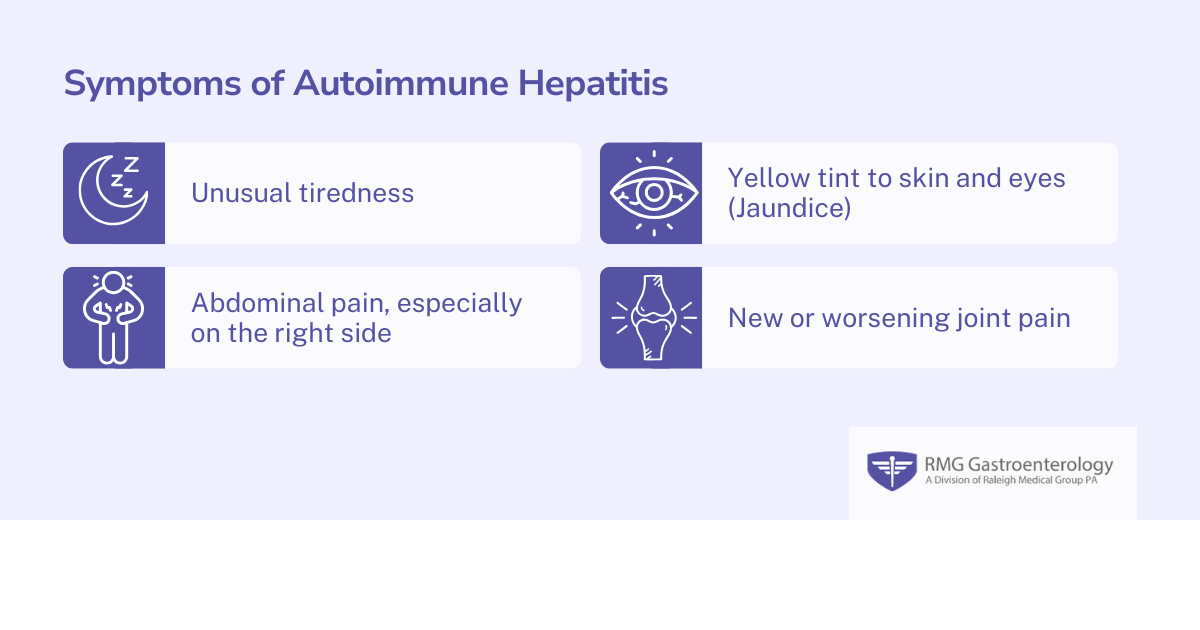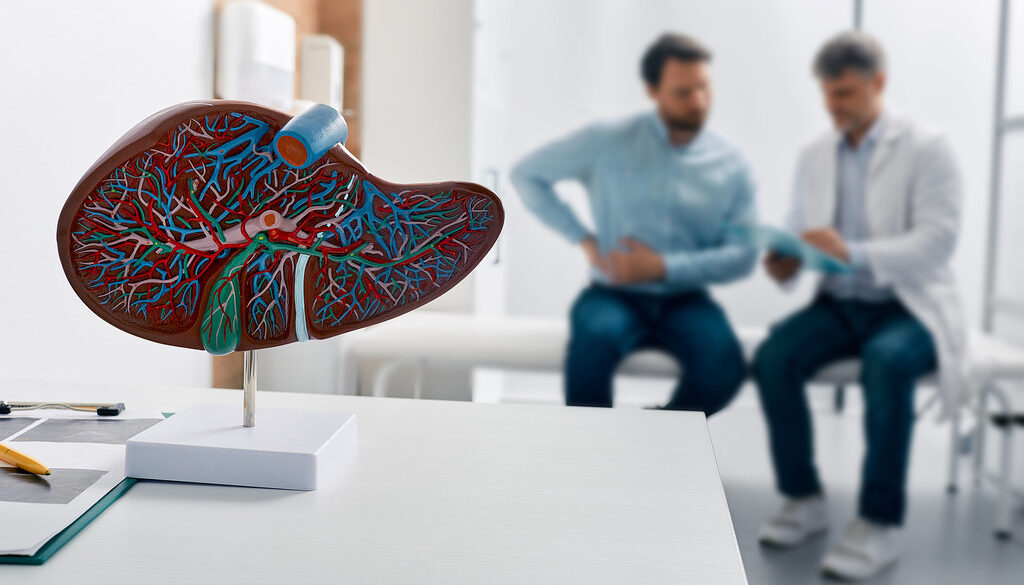Autoimmune Hepatitis Diagnosis: Facts, Treatment and Causes
If you’ve received an autoimmune hepatitis diagnosis, you may be wondering how this form of hepatitis is different from others, like hepatitis B. Many of our patients have extensive questions about this disease, and we want to address some of the most common ones we receive.
If you’ve received an autoimmune hepatitis diagnosis, you can take comfort in the fact that our Centers of Excellence include a Center for Liver Diseases. Through this center, we’re able to diagnose, manage and treat symptoms of several liver diseases ranging from fatty liver disease to cirrhosis.
While autoimmune hepatitis can affect anyone of any age, it’s more common in women. Cases seem to be increasing across the globe.
Good liver health is a vital aspect of how your body functions. Therefore, we wanted to explore this disease in depth, provide useful statistics, and explain the various treatments we offer at RMG Gastroenterology through our Centers of Excellence.
What Causes Autoimmune Hepatitis (AIH)?
Autoimmune hepatitis occurs when your body’s immune system damages your liver cells. As a result, your immune system damages your liver. We can diagnose it by looking for certain antibodies in the blood, higher levels of a specific protein (IgG), and signs of liver damage in tissue samples.
But this only tells part of the story.
In actuality, there are a variety of genetic and environmental factors that play a major role in the development of autoimmune hepatitis, partially the genes HLA-DR3 and HLA-DR4, which are primarily associated with autoimmune diseases. Environmental toxins that stress your immune system can also influence the development of AIH.
Some other triggers can increase the risk of AIH, and these include:
- Viral hepatitis (of any designation–A, B, C, D, or E.)
- Mononucleosis, which is caused by the Epstein-Barr virus
- Herpes
- Measles
Do You Have Symptoms of Autoimmune Hepatitis?
As we’ll mention later, AIH is a fairly rare disease, and its symptoms can mimic other liver diseases. Therefore, it’s vital that you schedule an appointment with our leading gastroenterologists so we can address the issue as soon as possible. As with so many liver diseases, early and timely treatment is crucial.

Not sure if you have symptoms of AIH? Ask yourself:
- Do I feel more tired than usual?
- Do I have abdominal pain (particularly on the right side)?
- Do I have a yellow tint to my skin and the whites of my eyes? (jaundice)
- Do I have new or worsening joint pain?
Is AIH Contagious?
No.
Some forms of hepatitis are caused by viruses, and those are contagious. They include hepatitis A, hepatitis B and hepatitis C.
However, with AIH, your autoimmune system “attacks” your liver. Because autoimmune hepatitis isn’t an infection but rather an issue with your own immune system, it’s not contagious.
How Rare is Autoimmune Hepatitis?
AIH is fairly rare. Occurrence varies by region. In the United States, the estimated prevalence is 31.2 out of 100,000.
However, researchers believe that this condition could be underdiagnosed because its symptoms are similar to other types of liver diseases. In addition, some signs may not appear until after the disease has progressed, which makes timely treatment by one of our liver specialists in Raleigh vital.
AIH can also have a severe impact on your overall health. Those with autoimmune hepatitis are more likely to have:
- Sjögren syndrome, where your immune system attacks your saliva and tears
- Systemic lupus
- Ulcerative colitis
- Celiac disease
- Rheumatoid arthritis
- Crohn’s disease
- Autoimmune thyroiditis
How Is Autoimmune Hepatitis Treated at Our Center for Liver Diseases?
The key to treating autoimmune hepatitis is to keep your immune system from attacking your liver. While there’s no cure for the disease, medications that lower your immunity can help prevent extensive liver damage.
Some medications we may use include prednisone. In certain cases, we might add azathioprine. These medications help reduce inflammation, which can slow down your immune system. Often, this treatment can reverse or stop progressive liver damage. This prevents it from developing into cirrhosis and more severe liver issues.
Most people with autoimmune hepatitis will need lifelong treatment, and regular check-ups with our expert gastroenterologists in Raleigh who can help monitor your liver and improve your quality of life.
In extreme cases where these medicines are unsuccessful, a liver transplant may be needed.
State-of-the-art liver Treatment Is Available Locally Through RMG Gastroenterology’s Centers of Excellence
The liver is a vital organ that cleanses your body of toxins. Even a minor liver issue can easily become a serious problem if it is not addressed in a timely manner. For those with autoimmune hepatitis, there is hope and help through our Center for Liver Diseases.
Led by nationally renowned physician Dr. Mitch Mah’moud, we use the latest evidence-based research to provide the highest level of quality care.
If you’ve been diagnosed with autoimmune hepatitis, or if you’re experiencing some of the symptoms we’ve listed above, please schedule an appointment with us today.
The content within this article and others on this website is only for educational purposes and should not be considered as medical advice. For any questions or concerns, please consult with your healthcare provider.
=====================
Sources:
Cleveland Clinic, “Autoimmune hepatitis,” https://my.clevelandclinic.org/health/diseases/17867-autoimmune-hepatitis
Luigi Muratori, Ansgar W Lohse, Marco Lenzi, Diagnosis and management of autoimmune hepatitis BMJ 2023; 380 https://www.bmj.com/content/380/bmj-2022-070201.short
Mayo Clinic, “Sjogrens Syndrome,” https://www.mayoclinic.org/diseases-conditions/sjogrens-syndrome/symptoms-causes/syc-20353216
Trivedi PJ, Hirschfield GMRecent advances in clinical practice: epidemiology of autoimmune liver diseases Gut 2021;70:1989-2003. https://gut.bmj.com/content/70/10/1989
Tunio, Nahel A. MD; Mansoor, Emad MD; et al,. Epidemiology of Autoimmune Hepatitis (AIH) in the United States Between 2014 and 2019: A Population-based National Study. Journal of Clinical Gastroenterology 55(10):p 903-910, November/December 2021 https://journals.lww.com/jcge/abstract/2021/11000/epidemiology_of_autoimmune_hepatitis__aih__in_the.15.aspx



